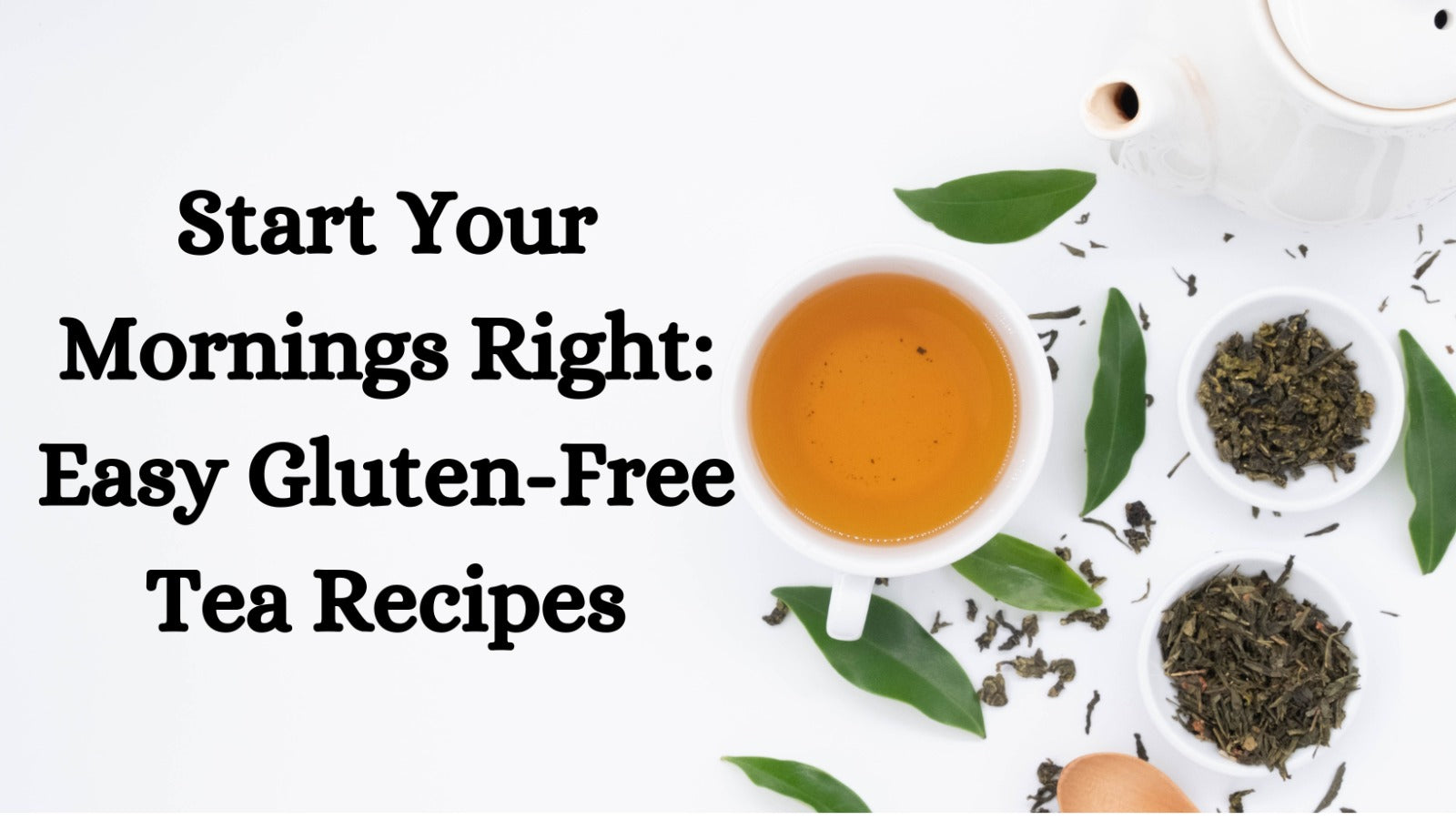In today's fast-paced world, stress is an unwelcome visitor that can take a toll on our physical and mental well-being. But what if there was a simple and natural way to alleviate stress and enhance our overall well-being? Enter tea therapy.
Tea has been cherished for centuries not only for its enticing flavors but also for its therapeutic properties. From calming herbal blends to invigorating green teas, this ancient beverage has the power to transform your well-being.
Tea therapy is more than just sipping a warm cup of tea; it's a mindful practice that nurtures both body and mind. The act of brewing tea itself can be a meditative experience, encouraging you to slow down and savor the present moment. And when you take that first sip, the unique combination of soothing aromas and health-promoting compounds can work wonders on your stress levels.
In this article, we will explore the incredible benefits of tea therapy and how it can help you manage stress, improve focus, boost immunity, and enhance your overall sense of well-being. So grab your favorite mug, sit back, and discover the transformative power of tea therapy.
The History and Origins of Tea Therapy
Tea therapy has a rich history that dates back thousands of years. It originated in ancient China, where tea was not only enjoyed as a beverage but also used for its medicinal properties. The Chinese believed that tea had the power to balance the body's energy and promote good health.
Over time, the practice of tea therapy spread to other parts of Asia and eventually the world. Today, tea is celebrated for its diverse flavors and therapeutic benefits. From the calming effects of chamomile tea to the invigorating properties of matcha, there is a tea for every mood and ailment.
The cultivation and preparation of tea have also evolved throughout history. From hand-picked leaves to modern tea plantations, the process of tea production has become more refined. With each cup of tea, you can connect to the rich traditions and cultural heritage that have shaped the world of tea therapy.
Benefits of Tea Therapy for Mental Health
Tea therapy offers a wide range of benefits for mental health. One of the significant benefits is its capacity to alleviate stress and induce relaxation. Many herbal teas, such as chamomile and lavender, have natural calming properties that can help soothe an anxious mind.
In addition to stress reduction, tea therapy can also improve focus and concentration. Green teas, in particular, contain caffeine and L-theanine, a unique amino acid that promotes alertness and mental clarity. By incorporating green tea into your daily routine, you can enhance your cognitive function and stay more productive throughout the day.
Moreover, tea therapy has been found to have mood-enhancing effects. Certain teas, like peppermint and lemon balm, have uplifting properties that can help combat feelings of sadness or low energy. By sipping on a cup of mood-boosting tea, you can give yourself a natural pick-me-up and improve your overall well-being.
Different Types of Tea and Their Therapeutic Properties
Tea therapy encompasses a wide range of teas, each with its own unique therapeutic properties. Let's explore some of the most popular types of tea and their benefits:
- Green Tea: Known for its high antioxidant content, green tea is a powerhouse when it comes to promoting good health. It can boost metabolism, aid in weight loss, and improve heart health. Additionally, green tea has been associated with a reduced risk of chronic diseases, such as diabetes and certain types of cancer.
- Black Tea: Rich in flavonoids, black tea offers numerous health benefits. It can help lower cholesterol levels, improve gut health, and reduce the risk of stroke. Black tea is also known for its energizing properties, making it a great alternative to coffee for a gentle pick-me-up.
- Herbal Tea: Herbal teas are caffeine-free and come in a wide variety of flavors and therapeutic benefits. Chamomile tea, for example, has calming properties that can help promote relaxation and improve sleep quality. Peppermint tea is known for its digestive benefits and can soothe an upset stomach.
- White Tea: Considered the least processed of all teas, white tea retains a high level of antioxidants. It can support healthy skin, boost the immune system, and promote overall well-being. White tea also has a delicate flavor profile, making it a favorite among tea enthusiasts.
By exploring different types of tea, you can find the ones that best suit your needs and preferences. Whether you're looking to relax, boost your energy levels, or improve your overall health, there's a tea out there for you.
How to Incorporate Tea Therapy into Your Daily Routine
Incorporating tea therapy into your daily routine is a simple and enjoyable way to enhance your well-being. Here are some tips on how to make tea therapy a part of your everyday life:
- Choose a variety of teas: Experiment with different types of tea to find your favorites. Stock your pantry with a selection of herbal, green, black, and white teas so that you have options for every mood and occasion.
- Create a tea ritual: Brewing tea can be a meditative experience. Take the time to prepare your tea mindfully, focusing on the aroma, color, and taste. Use a teapot and beautiful tea cups to make it feel like a special occasion.
- Set aside tea time: Dedicate a specific time each day to enjoy a cup of tea. Whether it's in the morning to start your day on a calm note or in the evening to wind down, having a regular tea ritual can help you relax and create a sense of routine.
- Practice mindfulness: While sipping your tea, practice mindfulness by being fully present in the moment. Focus on the flavors, aromas, and sensations of the tea. Let go of any distractions and savor the experience.
- Experiment with tea blends: Get creative and try blending different teas together to create unique flavor combinations. You can mix herbal teas with black or green teas to customize your brew and cater to your specific tastes and needs.
By incorporating these simple practices into your daily routine, you can fully immerse yourself in the world of tea therapy and reap its numerous benefits.
Tea Rituals and Mindfulness Practices
Tea rituals and mindfulness practices go hand in hand when it comes to tea therapy. They both emphasize the importance of being fully present and savoring the moment. Here are some tea rituals and mindfulness practices you can incorporate into your tea therapy practice:
- Japanese Tea Ceremony: The Japanese tea ceremony, also known as Chanoyu, is a traditional ritual that celebrates the art of tea. It involves the preparation and serving of matcha tea in a ceremonial manner. The ceremony is a way to cultivate mindfulness, harmony, and respect.
- Gongfu Tea Ceremony: The Gongfu tea ceremony is a Chinese tradition that focuses on the preparation and brewing of tea with precision and skill. It involves multiple infusions of tea leaves in small teapots, allowing for a more concentrated and flavorful tea experience.
- Tea Meditation: Tea meditation is a practice that combines the calming effects of tea with the mindfulness of meditation. Sit in a quiet space, hold your cup of tea, and focus on your breath as you sip. Let the tea and the present moment anchor your attention and bring you a sense of calm.
- Tea Journaling: Keep a tea journal to record your tea experiences and reflections. Write down the teas you try, their flavors, and how they make you feel. This practice can help you deepen your connection with tea and become more attuned to its therapeutic effects.
By incorporating these rituals and practices into your tea therapy journey, you can elevate your tea experience and cultivate a deeper sense of well-being.
Tea Blends and Recipes for Specific Well-being Concerns
Tea blends and recipes can be tailored to address specific well-being concerns. Here are some tea blends and recipes for common health issues:
- Sleep Aid Blend: Combine chamomile, lavender, and valerian root for a calming blend that promotes relaxation and better sleep quality. Brew a cup before bedtime to unwind and prepare your body and mind for a restful night's sleep.
- Digestive Health Blend: Mix peppermint, ginger, and fennel seeds for a tea blend that aids digestion and soothes an upset stomach. Sip on this blend after a heavy meal to alleviate discomfort and promote healthy digestion.
- Immunity Boosting Blend: Create an immunity-boosting blend by combining green tea, echinacea, and elderberry. This blend is packed with antioxidants and immune-boosting properties that can help strengthen your body's defenses.
- Energy Boosting Blend: If you're in need of an energy boost, try blending black tea with ginseng or yerba mate. These ingredients provide a natural source of caffeine and can help improve focus and alertness.
Experiment with different tea blends and recipes to find the ones that work best for you. Customize the ingredients and proportions based on your preferences and specific well-being concerns.
Tea Therapy and Physical Health Benefits
Tea therapy not only offers mental health benefits but also provides numerous advantages for physical health. Here are some ways tea therapy can enhance your physical well-being:
- Heart Health: Several studies have shown that regular tea consumption, especially green and black teas, can reduce the risk of heart disease. The antioxidants found in tea help protect the heart and blood vessels from damage.
- Weight Management: Certain teas, such as green tea and oolong tea, have been found to aid in weight loss and weight management. They can boost metabolism and increase fat oxidation, helping you achieve your weight loss goals.
- Digestive Health: Many herbal teas, including peppermint and ginger tea, have been used for centuries to soothe digestive issues such as bloating, indigestion, and nausea. These teas can promote healthy digestion and alleviate discomfort.
- Bone Health: Some teas, such as white tea and green tea, contain compounds that can help improve bone density and reduce the risk of osteoporosis. Regular tea consumption, along with a balanced diet, can contribute to strong and healthy bones.
By incorporating tea therapy into your lifestyle, you can support your physical health and enjoy the numerous benefits that tea has to offer.
Tea Therapy and Stress Management Techniques
Tea therapy is a powerful tool for stress management. Here are some techniques that combine the benefits of tea therapy with stress reduction:
- Deep Breathing with Tea: Combine deep breathing exercises with tea therapy to create a calming and centering practice. Take slow, deep breaths as you sip on your tea, allowing the soothing aroma and warmth to help you relax.
- Tea and Mindfulness Meditation: Practice mindfulness meditation while enjoying a cup of tea. Focus on the present moment, letting go of any thoughts or worries. Allow the tea to anchor your attention and bring a sense of peace and tranquility.
- Tea and Yoga: Incorporate tea into your yoga practice for a mindful and rejuvenating experience. Sip on a cup of tea before or after your yoga session to enhance relaxation and promote a sense of well-being.
- Tea and Aromatherapy: Combine the aromatherapy benefits of tea with essential oils. Add a drop of your favorite essential oil to your tea or use a tea blend that includes aromatic herbs like lavender or rosemary. Inhale the soothing scent as you sip on your tea.
These techniques can help you manage stress, promote relaxation, and create moments of calm in your daily life.
Conclusion and Final Thoughts on the Transformative Power of Tea Therapy
Tea therapy is a wonderful practice that can transform your well-being and help you find balance in a busy world. By embracing tea as more than just a beverage, you can tap into its therapeutic properties and experience its numerous benefits.
From reducing stress and improving mental health to boosting physical well-being, tea therapy offers a holistic approach to self-care. The act of brewing and sipping tea can be a mindful ritual that allows you to slow down, savor the present moment, and nurture both your body and mind.
So, the next time you feel stressed or overwhelmed, reach for a cup of tea. Let its soothing aromas and health-promoting compounds work their magic on your well-being. Sip your stress away and embark on a journey of transformation with tea therapy.
Remember, it's not just a cup of tea; it's a moment of self-care and a path to a healthier, more balanced life.




